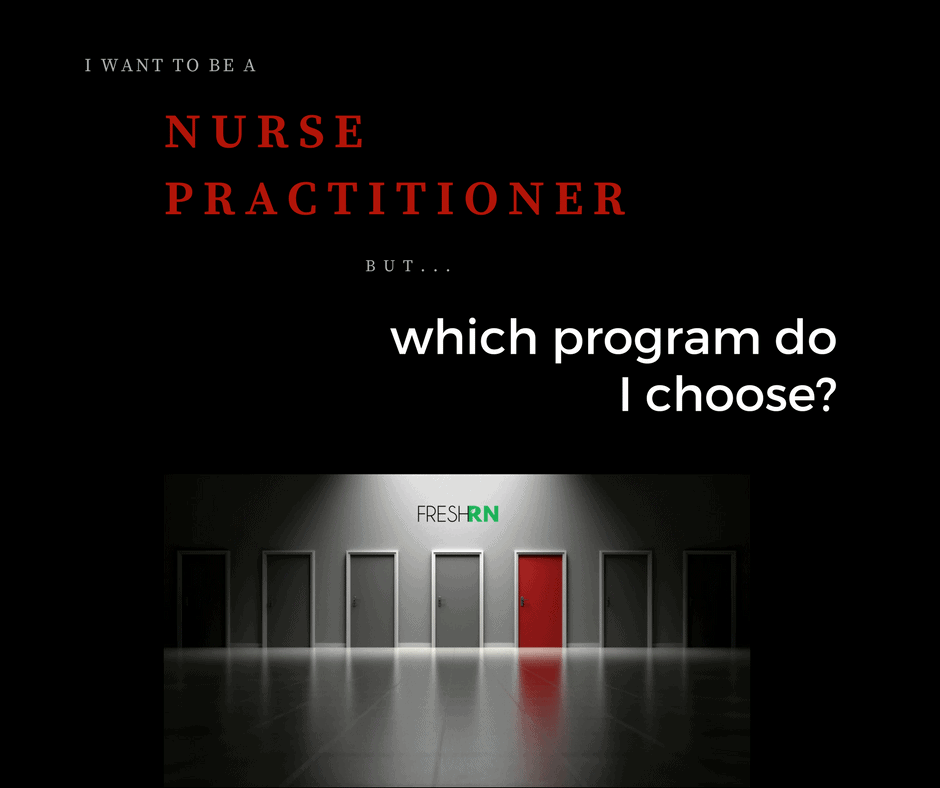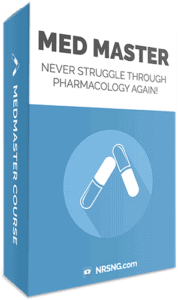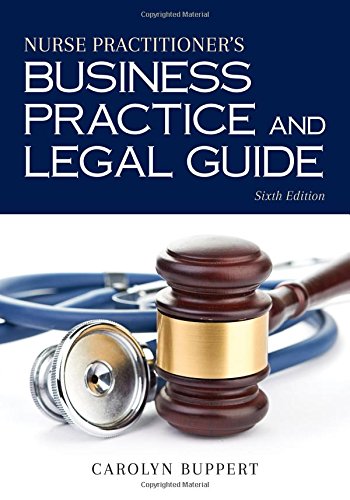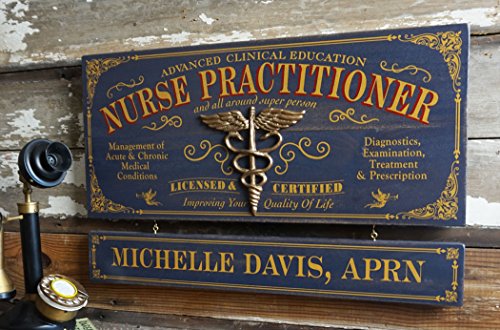Hey all – this week’s guest post is by none other than Sean Dent, MSN, ACNP-BC, CCRN! We realize how confusing the whole nurse practitioner world is right now, especially for those of you just beginning nursing school who know you want to eventually become an NP. Check out this post that outlines the options! – Kati
So you want to become a Nurse Practitioner?

Nurse Practitioners (NP’s) are in high demand with an exciting job outlook over the next decade. According to the Bureau of Labor and Statistics the employment of advanced practice nurses is projected to grow 31% (source).
This difference between the various roles an advanced practice nurse can have has caused confusion throughout the nursing profession (and the public) when speaking about, referring to, or pursuing a career in this role.
I will attempt to clear the air by breaking things down into manageable parts. This post is not all-inclusive but should help you define important terms, concepts, and ideas when choosing a career as a nurse practitioner. I’ve also included a mind map that helps clarify some of the questions you will encounter. And keep your head up – this is a really confusing topic, even to experienced nurses. The way NP’s are being educated is continuing to evolve as well.
An NP is a registered nurse who possesses an advanced nursing degree in a specific area providing clinical expertise to patients by diagnosing and treating illnesses (source). They coordinate health care services autonomously and collaboratively with physicians and other healthcare professionals.
Different kinds of nurse practitioners – what do all those letters mean?
NP’s have differing nomenclature (acronyms) depending on their given area of expertise and in which state they practice.
Here is a (non-exhaustive) list of the many acronyms NP’s can have:
- NP = Nurse Practitioner
- APRN = Advanced Practice Registered Nurse
- CRNP = Certified Registered Nurse Practitioner
- CPNP = Certified Pediatric Nurse Practitioner
- NNP = Neonatal Nurse Practitioner
- FNP = Family Nurse Practitioner
- AG = Adult-Gerontology
- BC = Board-Certified
For example, I’m an ACNP-BC which means I am an Acute Care Nurse Practitioner who is Board Certified.
Important questions to answer
When picking a program, there are a few important questions you must answer. This may take some soul-searching and doesn’t always come to a definitive conclusion – and that’s okay! It’s important to figure out these answers and take time now to pick the right program instead of jumping in and later figuring out you’re in the wrong one.
What patient population do you want to focus on?
Do you want to work with kids, entire families, adults-only, or neonatal infants? This is arguably the most important question to answer.
This is an important distinction:
- Family (Primary Care) = all patients of all ages across the lifespan (FNP)
- Adult = only adult aged patients
Additional specializations options include:
- Pediatric
- Neonatal
- Gerontological
- Psychiatric
- Women’s
- Oncology
- Emergency care
- Midwifery
Keep in mind, not all schools offer all specializations. You may need to look around at different schools to see what’s offered to find the specialization you’d like.
We’ve even created this amazing and super handy download that covers all the important questions you must answer before picking a program.
What clinical setting do you mainly want to work in?
Do you want to work in the outpatient environment, seeing patients in a clinic… or would you rather work on the inpatient side of things and treat patients while they’re in the hospital? Another way to view this is their level of acuity – how sick are they right now? Is it an acute or chronic illness? Is this an acute event?
I use the term “mainly” because while you can pick where you’d prefer to work most of the time, it is possible for these areas to co-exist.
The answer to this question will help you decide on a subspecialty. A subspecialty requires additional training and education with certification. Examples of these include:
- Acute Care
- Emergency
- Neurology
This is further complicated by having these two areas crossover. You can possess both specialty and subspecialty certifications. In some cases, you can attain both during a single academic pursuit, while in other cases you have to return for a post-degree certification (yes it’s very confusing). And unfortunately, this can vary greatly by state and institution.
As an example, I am an Adult Nurse Practitioner with an Acute Care certification. I care for the acutely ill (in-patient higher acuity) adult-aged patient population. Therefore I cannot legally care for the pediatric or neonatal aged patient regardless of their level of acuity.
There are variations of this care model. You can modify your place of employment based on the acuity and patient age. As an acute care certified NP I can care for the acutely ill in any typesetting, this includes specialty offices (which is technically an outpatient setting). Once again, it’s all very confusing and there is not a singular set standard of direction. The free mind map we’ve included also can help bring some clarity to this confusing process.
So after you decide where you want to practice and what patient population you want to care for, the next big decision is what type of degree program to pursue?
We answer this question in the next blog post, which will be on our new site, FreshNP.com!
Welcome to FreshNP!

We are creating a website – FreshNP.com – and podcast specifically for nurses who want to become nurse practitioners! From getting into NP school to picking a program, to transitioning to practice, we will cover all of the burning questions, concerns, and needs of prospective and current nurse practitioners.
I, Sean, will be the head writer and content creator. Kati Kleber, BSN, RN, CCRN with 7 years of nursing experience will be the voice of the interested nurse, posing questions to myself and interviewing NPs from other specialties.
Our goal is to grow new NP’s – stay tuned!
For more info on how to become a nurse practitioner check out:

NP School and Beyond: Tips For The Student Nurse Practitioner Nurse Practitioner’s Business Practice And Legal Guide
Nurse Practitioner’s Business Practice And Legal Guide Nurse Practitioner Wood Sign with Personalized Nameboard
Nurse Practitioner Wood Sign with Personalized Nameboard






Thanks for mentioning the Gerontological NP specialty. Having an NP in the nursing home is so very beneficial, and with our aging population, the needs will grow enormously in the future.
You are so very welcome! It’s already becoming the standard, you are so correct.
I’m looking forward to the rest of this series. As I make my own decisions about grad school, it’s the opportunity cost that most troubles me. Investment of savings toward graduate school vs retirement accounts, and more importantly, investment of time – with one toddler another on the way. These decisions become more challenging when I’m already supported, and growing as an ICU RN.
My boyfriend has always wanted to become a nurse practitioner someday because that’s how he feels he could contribute to the greater good later in life. He has quite a calm temperament so I think he can easily manage emergency situation without panicking. I think that’s the kind of practice he should eye for when getting a nurse practitioner continuing education someday.